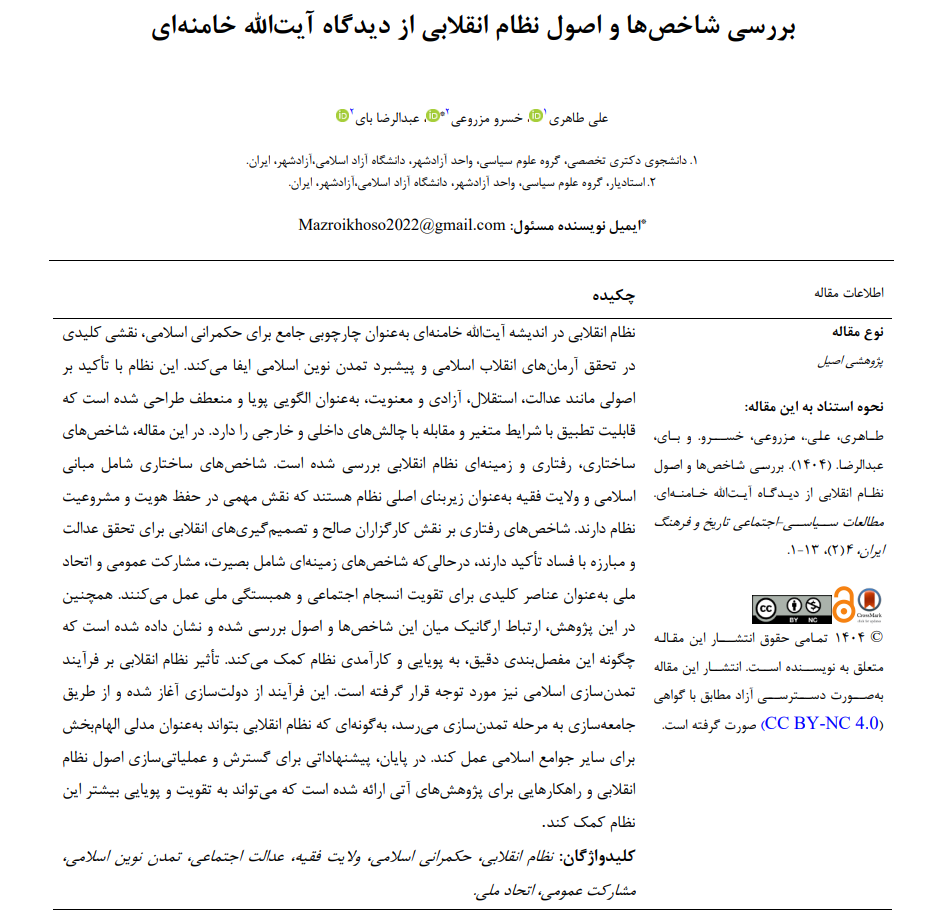An Examination of the Principles and Indicators of the Revolutionary System in the Thought of Ayatollah Khamenei
Keywords:
Revolutionary system, Islamic governance, Guardianship of the Jurist, social justice, modern Islamic civilization, public participation, national unityAbstract
The revolutionary system in the thought of Ayatollah Khamenei serves as a comprehensive framework for Islamic governance, playing a pivotal role in achieving the ideals of the Islamic Revolution and advancing modern Islamic civilization. This system, emphasizing principles such as justice, independence, freedom, and spirituality, is designed as a dynamic and flexible model capable of adapting to changing circumstances and countering internal and external challenges. This article examines the structural, behavioral, and contextual indicators of the revolutionary system. Structural indicators include Islamic foundations and the principle of the Guardianship of the Jurist (Wilayat al-Faqih), which play a crucial role in maintaining the system's identity and legitimacy. Behavioral indicators focus on the role of righteous officials and revolutionary decision-making in achieving justice and combating corruption, while contextual indicators, including public insight, participation, and national unity, act as key elements in strengthening social cohesion and solidarity. The article also explores the organic connection between these indicators and principles, demonstrating how their precise articulation contributes to the system's dynamism and efficiency. Furthermore, the impact of the revolutionary system on the process of Islamic civilization-building is discussed, spanning from state-building to society-building and ultimately reaching the stage of civilization-building, enabling the revolutionary system to inspire other Islamic societies. Finally, recommendations are presented for expanding and operationalizing the principles of the revolutionary system, along with suggestions for future research that can further enhance the system's vitality and effectiveness.
Downloads
References
Abbasi, M. (2018). The role of Wilayat al-Faqih in achieving the ideals of the Islamic Revolution. Islamic Studies Journal, 22(1), 56-75.
Aslani, E. (2018). The movement of the revolutionary system and the triangle of ideals. Journal of Political Studies and Islamic Governance, 24(3), 1-15.
Ghahami, H., & Ajorloo, M. (2018). The Islamic Revolution and the New World Order. Political Science Journal, 16(2), 167-183.
Hosseini, K. (2017). Social justice in the thought of Ayatollah Khamenei. Islamic Thought Quarterly, 18(2), 123-140.
Mohammadi, J. (2016). Independence and national resilience in the revolutionary system. Journal of Revolutionary Thought, 12(4), 87-102.
Moienipour, E., & Ghorasban, F. (2019). Examining internal and external challenges of the Islamic Republic system. Public Policy Journal, 27(4), 1-10.
Mousavi, S. H. (2017). Examining Islamic governance in the thought of Ayatollah Khamenei. Journal of Religious and Political Thought, 14(4), 75-90.
Nasiri, F. (2019). Public participation and national unity in the revolutionary system. Social Development Journal, 10(1), 71-90.
Soleimani, A. (2017). Modern Islamic civilization and the role of the revolutionary system. Islamic Politics Quarterly, 14(3), 98-112.
Yazdani, A., & Qasemi, M. (2011). Indicators of the Islamic Revolution and its civilizational analysis. Journal of Islamic Revolution Thought, 8(1), 205-220.

Downloads
Published
Submitted
Revised
Accepted
Issue
Section
License
Copyright (c) 2025 علی طاهری (نویسنده); خسرو مزروعی (نویسنده مسئول); عبدالرضا بای (نویسنده)

This work is licensed under a Creative Commons Attribution-NonCommercial 4.0 International License.







